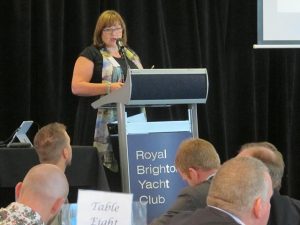Barring any unforeseen changes advisers will be required to operate under the rules of the Life Insurance Framework regime from 2018. It may be easy to regard this as a set-back but the delayed start date provides opportunities for advisers to review their business model at their own pace. What this looks like will vary between advisers and businesses and in this article riskinfo’s Senior Journalist, Jason Spits, talks with some advisers around how they are planning for the future and what changes they will make under the LIF.
One year ago, financial advisers were being told they had six months to prepare for the beginning of the transition to the new remuneration models outlined in the proposed Life Insurance Framework (LIF). Interestingly, a full year later LIF is still on the cards and not yet delivered while advisers have been told they now have a year to prepare to transition to the new regime.
Views about what advisers should do range from the formulaic (eg: more ongoing commission will offset up-front commission) to the practical (eg: get more clients, be more efficient) to the philosophical (eg: why are you in business and what is your value proposition?).
As Rando and Associates Managing Director, Mark Rando writes in his article in this edition of the riskinfo e-Magazien (See: Living with LIF), preparing for life after LIF takes a combination of these approaches and, as the following snapshots show, some of his peers have already made the shift and identified both unique and universal problems and solutions.
A few years of pain
A ‘direct hit to the bottom line’ and ‘a few years of pain’ is how Peter Monnock, Risk Adviser at Mainline Insurance Agencies in Perth, is currently viewing the impact of LIF on his business.
Despite his small practice, mainly pitched at mid-market ‘mum and dad’ clients, being streamlined and provided with good licensee support, he can’t see any way to avoid the financial impact of LIF even though he has made plans to deal with it.
“Any decrease in up-front commission will come off the top of my income because all my fixed costs, such as administration, back-office and compliance, will remain. So any shortfall will be coming directly out of my wallet,” Monnock said.
“Under the legislation, I will also be expected to do more work with more touch points but will end up being paid half of what that same work used to pay,” Monnock added.
Having looked ahead, he believes the best solution for his business is to move from up-front commission to hybrid commission despite the fact that he feels there will be ‘a few years of pain’ even under this model.
When asked if the solution is finding more clients and writing more business Monnock said this approach sounds good, but he would still have to source new leads and then service them as clients, while receiving less income from each one of them.
“I could get more clients but there is not much more that I can do differently than my current advice model. I could service more clients with less resources but the quality of the advice may fall and I would still have to find qualified clients to service,” Monnock said.
Any decrease in up-front commission will come off the top of my income…
Instead, he will shift his focus onto business clients where he can also offer general insurance services and specialised life insurance advice for issues such as key-person risk, which he sees as being stickier and longer lasting business. Yet, he does not see this as an optimal outcome for everyone.
“I have tightened things up as much as I could but will still take a pay cut for a few years and move away from dealing with people who are usually under-insured, which is not a good outcome for anyone,” he said.
Adjusting to the times
Monnock is not alone in looking at hybrid commissions as the way ahead, with Michael Ord, Owner of Coremotion Financial Services in Harvey Bay, having already taken that step when the LIF remuneration model was first released.
“I looked forward and jumped on board with hybrid before I was forced to do so, when this issue was first raised. The new remuneration arrangements will have less of an effect on me now than for some advisers who have yet to act,” Ord added.
Ord does admit the path to hybrid commissions resulted in a dip in income, which he expects to recover in the next year, but that was anticipated after he modelled the impact through his monthly statements and prepared for it accordingly.
“I looked at it from the point of inception and realised it would be a larger initial impact than if I ran a holistic advice practice, and have decided to upgrade my skills via a Masters of Financial Planning and offer a wider range of services,” Ord said.
“You have to ask yourself how you will continue or else you can lose energy and motivation on something you can’t change. My plan is to be a better adviser, as I am not leaving the industry, but will have to adjust to the times,” Ord stated.
Part of this adjustment will be to offer business succession planning advice to clients coming from referral relationships with Ord stating these kinds of clients ‘don’t blink when you place a fee schedule in front of them’.
“The plan is to become involved in project managing their issues as well as providing for their insurance needs and going through the whole process while sitting with their accountant and all of us ending up on the same page. In my experience this type of work has no push back on price,” Ord stated.
Reclaiming the Positive
As someone who has been working under a hybrid commission model for a few years, Ben Woolgrove, Financial Adviser at Insurance Works on Queensland’s Sunshine Coast, still sees LIF having an impact that will only be offset by the longevity and stability of his practice.
Woolgrove said the shift to hybrid took place before LIF had become an issue but the new legislation and remuneration arrangements will bite into that part of his business in which he offers up-front commissions.
“I have adopted a mix of hybrid and up-front commission and expect that LIF will impact about 20% of our income, but we are fairly well established at present. People have predicted gloom and doom but we believe we will survive through good referral business,” Woolgrove said.
“We went with a hybrid model with clients who had stable jobs and incomes and we have found it works better. We look at each case individually and if we can see that things are likely to change frequently for a client we have retained up-front commissions,” Woolgrove stated.
“Across the board, if we do the same amount of new business in 2017 as we did this year, we expect LIF will create around a 20% decrease in up-front income.”
Woolgrove expects that new business will increase in 2017 to minimise the impact of LIF but, like Monnock, believes the call to ‘just get more clients’ is too simplistic as a solution to offset lost commission income.
You have to ask yourself how you will continue or else you can lose energy and motivation on something you can’t change…
“The Government has said it will make it harder for advisers to do business and we should just get more clients. If we could find more suitable and interested clients we would probably have them onboard already,” Woolgrove said, adding that offsetting negative publicity around life insurance will also be part of his work over the next few years.
He said this work stems from the general negative coverage some direct and group life insurers and products have attracted over the past year in which there has been no separation from retail advised insurance.
“We get a number of referrals from accounting practices and their chief concern is whether they have some insurance cover, what type of cover they have and at what level,” Woolgrove said.
“Any negativity they have towards life insurance is whether the life insurer I recommend will pay, which clearly has been an issue with direct insurance in the past few years. Our biggest efforts are going to be in client education because they are clearly not getting that elsewhere.”
Removing friction points
Unsurprisingly, fee-only advisers are reporting minimal expected impact on their income levels but are preparing for a shift in how clients see risk advice and in how they will deliver it.
Phil Thompson, Director of Thompson Financial Services in Melbourne, says LIF will continue to shape the way he approaches the provision of risk advice. At present, he charges level commissions for risk only clients and fee for service for other advice but will move more of his clients to a wider advice model and do less stand-alone risk advice.
“People are questioning the sums that are being recommended for their cover and the remuneration for the adviser and for some it is becoming a friction point. We felt that with flat dollar, level commissions, clients feel they are not being pushed in a certain direction because of the commissions for the adviser,” Thompson said.
“The LIF changes are pushing me towards not having any ‘risk-only’ clients but offering a full-service approach across the board, and if commissions do fall substantially it would make sense to charge fee for service as well for the risk portion of the advice,” he said.
…if we do the same amount of new business in 2017 as we did this year, we expect LIF will create around a 20% decrease in up-front income…
As part of this shift, Thompson is interested in tackling inefficiencies in the life insurance advice process, claiming that clients have been charged for it in the past. He said that if advisers can’t charge more for their advice, or for the product, then the advice and placing of cover needs to be more efficient.
“This has not been examined because commissions have been good for so long and there was no need to change. If we take an example from the investment side we can see it used to be cumbersome before processes were made easier and cheaper to the point where robo-advice can mimic investment advice,” Thompson stated.
“Risk advice is unlikely to be fully automated but we should expect it to be easier to place business under LIF because if insurers are not getting new business they will work to make it easier for that to happen.”
Be the expert, not the process
For Ben Nash, Founder and Financial Adviser at Pivot Wealth in Sydney, who also works on a fee-only basis, LIF is a defining moment for advisers where new models can be adopted to move into the future or old models can be retained and worked through with difficulty in the years to come.
“There are options for advisers in the risk space but it does require rethinking the advice model. Using available technology you can still deliver risk advice and be profitable but it won’t be the same model we have generally used for the past 20 years,” Nash said.
“It also answers the question of what we do with people who do not want to pay for life insurance advice and the insurance cover itself because we now have the tools to deliver scaled advice online in a low touch way. The adviser still provides education and information specific to that client, which are the areas that are valuable and where they need to be involved,” he said.
This is the approach Nash is taking with his clients, who are mainly young professionals and are comfortable with paying fees for life insurance advice but still want an expert opinion on what action they should take.
Nash said this is what financial advice has been about all along and the recent focus on life insurance and LIF plays into the hands of good advisers.
“People are turned off by sub-standard outcomes and the perceptions around direct insurance and are lumping all life insurance in together because they are not seeing the benefits,” Nash said.
“Education will always be a primary role for advisers in preparing for LIF and our role has not changed from educating and then facilitating people to make their own decisions. If we can change their conversations around insurance and the outcomes they receive we should expect more people will be driven to seek advice.”












